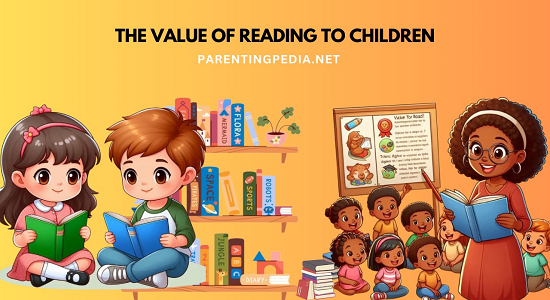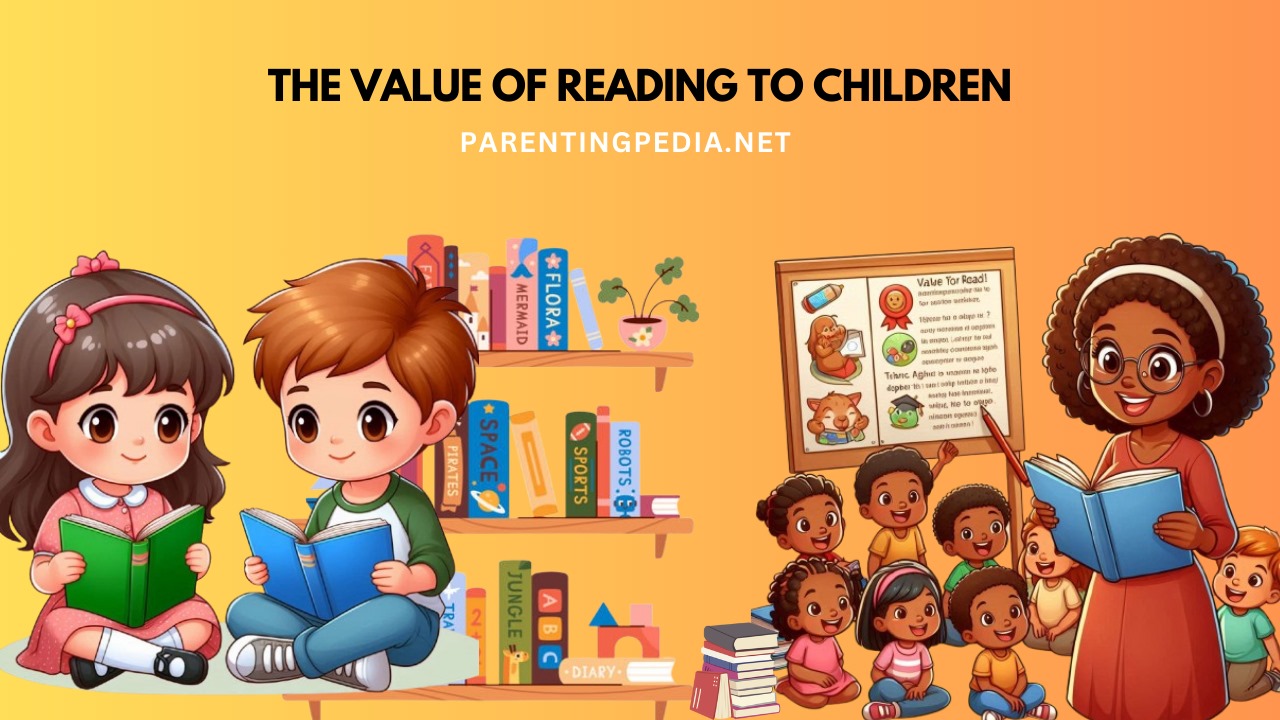Reading to children is one of the most valuable activities parents and caregivers can engage in. It is a simple yet profound way to support a child’s cognitive, emotional, and social development. The benefits extend far beyond the immediate enjoyment of a story. It lays the foundation for lifelong learning, critical thinking, and emotional well-being. Reading plays a crucial role in language acquisition and promote imagination and creativity in children. It also helps children develop social skills and cultural awareness over time. This article explores the numerous advantages of reading to children, how it influences their development, and strategies for making it an integral part of a child’s life.
Importance Of Reading In Cognitive Development Of Children
Language Acquisition and Vocabulary Expansion: One of the most significant benefits of reading to children is its impact on language acquisition. From infancy, children are exposed to a wide range of sounds, words, and sentence structures through reading. This exposure is crucial for language development, as it helps children understand the rhythm and flow of language, enriches their vocabulary, and improves their ability to communicate. Books often introduce children to words and phrases that they might not encounter in everyday conversation, expanding their vocabulary and enhancing their understanding of language. The more words children are exposed to at an early age, the better their language skills will be as they grow.
Enhancing Cognitive Skills: Reading to children also plays a critical role in enhancing cognitive skills such as memory, attention, and critical thinking. Listening to stories requires children to focus and follow along, which helps improve their concentration and memory retention. As they listen to the story, they learn to recognize patterns, predict outcomes, and make connections between different ideas. These cognitive processes are fundamental for problem solving skills and logical reasoning in children. Furthermore, the questions and discussions that arise during reading sessions develop a child’s curiosity and encourage them to think critically about the story and its themes.
Boosting Imagination and Creativity: Books transport children to different worlds, allowing them to experience a variety of cultures, perspectives, and scenarios. This exposure to diverse ideas and experiences help in development of child’s imagination and creativity. Through stories, children can visualize characters, settings, and events that are beyond their immediate reality, which promote creative thinking and innovation. Imaginative play, often inspired by stories, is an essential part of boosting imagination, as it allows children to explore new ideas, solve problems, and express themselves creatively.
Importance Of Reading In Emotional Development Of Children
Emotional Awareness and Empathy: Reading to children helps them develop emotional awareness and empathy by introducing them to characters and situations that build a range of emotions. As children engage with stories, they learn to identify and understand different emotions, both in themselves and others. This emotional awareness is crucial for developing empathy, as it enables children to recognize and respond to the feelings of others. Through the experiences of characters, children gain insight into different perspectives and situations, which helps them build empathy and understanding. Reading a story about a character dealing with loss to child can help him/her understand and empathize with someone who is grieving.
Also Read: The Importance Of Early Childhood Education
Emotional Bonding and Security: Reading to children also develop emotional bonding between the child and the adult. The shared experience of reading creates a sense of closeness and security, as children associate reading with comfort, attention, and love. This bonding time is particularly important in building a strong, trusting relationship between the child and the caregiver. The routine of reading together can provide children with a sense of stability and reassurance, which is essential for their emotional well-being. Moreover, the positive associations formed during these reading sessions can make children more likely to seek out books and reading as a source of comfort and relaxation throughout their lives.
Building Resilience and Coping Skills: Stories often present characters facing challenges, making difficult decisions, or overcoming obstacles. By reading these stories, children learn about resilience and coping strategies. They see how characters manage difficult situations, which can provide them with tools for handling their own challenges. Reading about different life experiences can also help children process their own emotions and develop a better understanding of how to deal with complex situations. This ability to empathize with characters and see different solutions to problems contributes to the development of emotional resilience, helping children manage stress and difficulty more effectively.
Importance Of Reading In Social Development Of Children
Social Skills and Understanding Social Norms: Reading to children helps them develop social skills and understand social norms. Many stories revolve around relationships, friendships, and social interactions, providing children with examples of how people communicate, cooperate, and resolve conflicts. Through these narratives, children learn about appropriate behavior, the importance of sharing, taking turns, and the consequences of actions. These lessons are crucial for helping children manage their own social interactions and build positive relationships with others.
Cultural Awareness and Diversity: Books guide us into different cultures, lifestyles, and experiences. Reading to children exposes them to a variety of perspectives, helping them develop cultural awareness and appreciation for diversity. Through stories, children can learn about traditions, values, and ways of life that are different from their own, developing an open minded and equal attitude towards others. This early exposure to diversity is important in helping children develop a broader understanding of the world.

Practical Strategies For Reading To Children
Start Early and Read Regularly: The benefits of reading to children start as early as infancy, so it is important to read to them as soon as possible. Even though babies may not understand the words, they benefit from hearing the rhythm and melody of language and seeing the pictures in the books. Establishing a routine of regular read time, whether it is before bed, after meals, or during quiet time, helps make reading a consistent and valued part of children’s daily life.
Choose Age Appropriate and Diverse Books: Selecting age appropriate books that match a child’s developmental stage is important for keeping them engaged and interested in reading. For younger children, picture books with simple text and colorful illustrations are ideal, while older children might enjoy stories with more complex plots and characters. It is also important to choose a diverse range of books that introduce children to different cultures, perspectives, and experiences. This diversity helps children develop a broader understanding of the world and a greater appreciation for differences.
Use Expressive Techniques: Using expressive reading techniques, such as changing your tone of voice, adding sound effects, or using gestures, can make the story come alive for children. This expressive way captures a child’s attention and makes the experience more engaging and enjoyable. It also helps convey the emotions and actions of the characters, making it easier for children to connect with the story and understand its meaning.
Make Reading Interactive: Reading should be an interactive experience that engages children and encourages their participation. Asking questions about the story, discussing the characters’ actions, and encouraging children to predict what will happen next are all ways to make it more interactive. This interaction helps children develop critical thinking skills and deepens their understanding of the story.
Conclusion
Needless to say, reading to children is essential for their cognitive, emotional, and social development. It enhances language skills, promotes empathy, and nurtures a life long love of learning. Regular read sessions also create strong emotional bonds between children and caregivers, promoting a sense of security and comfort. Furthermore, it develops a love for books and learning in children, setting the foundation for academic success and passion for knowledge. By making it a regular and engaging activity, parents and caregivers provide children with the tools they need for academic success and overall well-being.
FAQ
Why is reading important in children’s life?
Reading is important in children’s life as it enhances language skills, develop imagination, promote empathy and builds a foundation for lifelong learning and academic success.
Why is it important to teach reading to children?
Teaching reading to children is crucial because it develops language skills, boosts cognitive abilities, and develop a love for learning, which are essential for academic success and overall personal growth of children.
Remember, the greatest reward of parenting lies in watching
your children soar with love and confidence.
Till then keep smiling and be happy
🎉 Score Freebies by Completing Fun Offers – Start Now!

